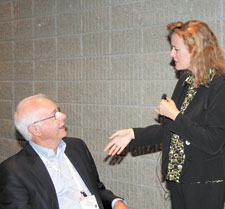Sessions explore legislative advocacy
Individual veterinarians as well as the AVMA are advocating for federal and state legislation that will benefit the profession and are speaking out against legislation that could be detrimental.
That's according to the four speakers during the AVMA Advocacy series at the AVMA Annual Convention. The speakers touched on specific legislative issues but focused on how the AVMA and veterinarians can and do advocate for the profession throughout the legislative process.

Addressing state-level advocacy was Adrian Hochstadt, JD, assistant director for state legislative and regulatory affairs in the AVMA Communications Division. Hochstadt said, "As the Association is ratcheting up advocacy at the state level, so are other organizations."
State legislative issues range from animal cruelty to veterinary licensure, Hochstadt said. Some issues, such as noneconomic damages, are playing out in the courts.
Hochstadt said AVMA efforts in state advocacy include a new program that involves veterinarians speaking at law schools, many of which offer courses in animal law.
Stephanie Fisher, AVMA grassroots coordinator, spoke about the role that social media such as Facebook have for organizations advocating particular positions on federal legislation.
Many young people have grown up with social media, Fisher said, but some older people are not sure how to participate in this aspect of the Internet. She said, "You really have to just get out there and do it."
Fisher noted that the AVMA Congressional Advocacy Network has 2,500 followers on its Facebook page.
Dr. Mark T. Lutschaunig, director of the AVMA Governmental Relations Division in Washington, D.C., spoke about how the GRD lobbies Congress.
"Lobbying is not a bad thing," Dr. Lutschaunig said. "Congress needs to hear from the profession."
The GRD lobbies largely by meeting with congressional staff and working with various coalitions. Contributions from the nonpartisan AVMA Political Action Committee to candidates help elect legislators friendly to the profession and help the GRD later gain direct access to members of Congress and congressional staff.
When working for the profession in Washington, D.C., "We're not Democrat or Republican," Dr. Lutschaunig said. "We're the veterinarian party."
Dr. Lutschaunig explained that the Executive Board decides the positions the AVMA takes on legislation, with input from the Legislative Advisory Committee and other AVMA committees and councils.
The GRD currently is lobbying on legislation regarding veterinary shortages, small business issues, animal welfare, and other issues of interest to the profession.
Stephanie Vance of Advocacy Associates gave two presentations about how individuals can advocate on legislation.
"I think the problem with advocacy is people don't see how it connects to their day-to-day work," Vance said. Yet, government policies affect people all day long.
Vance said the three stages of advocacy are speaking out, being heard, and being agreed with. Succeeding at advocacy also requires a strategy. Vance said advocates should conduct background research, build an advocacy network, prepare and motivate the network, build a calendar of actions, and stay on target.